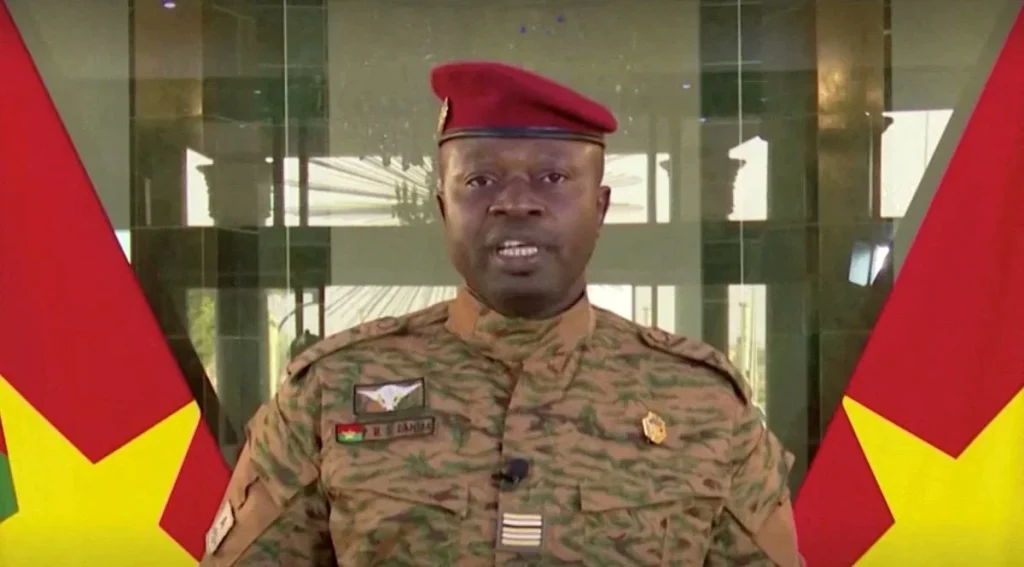In a significant step toward stabilizing Burkina Faso’s turbulent political landscape, Lieutenant-Colonel Paul-Henri Sandaogo Damiba was ceremonially sworn in as president on Wednesday, following his leadership of a January 2022 coup. The event marks a pivotal moment for the West African nation, which has been grappling with a prolonged jihadist insurgency and political upheaval.
A Ceremonial Inauguration
The swearing-in ceremony, held in Ouagadougou, formalized Damiba’s role as president and head of the armed forces, a position he assumed after ousting elected president Roch Marc Christian Kaboré on January 24, 2022. The brief event took place before representatives from the military, political parties, trade unions, and the diplomatic corps. Clad in his signature camouflage uniform and red beret, Damiba refrained from delivering a speech, letting the occasion speak for itself.
The inauguration follows the adoption of a “transition charter” signed by Damiba on Tuesday, outlining a roadmap to restore civilian rule by 2025. This charter sets a 36-month transition period, longer than the 30 months initially proposed by a junta-appointed commission. “The extended timeline reflects the complexity of stabilizing a nation facing both security and governance challenges,” noted a regional political analyst.
Details of the Transition Plan
The transition charter establishes a framework for Burkina Faso’s return to democratic governance. It includes the formation of a 71-member legislature and a 25-member government led by a civilian prime minister. Notably, the charter prohibits Damiba and members of the transitional legislature and government from running in the “presidential, legislative, and municipal elections” scheduled to conclude the transition in 2025. This measure aims to ensure a fair electoral process and prevent the entrenchment of military rule.
Burkina Faso, one of the world’s poorest nations, has faced significant volatility since gaining independence from France in 1960. The landlocked Sahel state has been rocked by coups and insurgencies, with the latest crisis fueled by public frustration over the government’s handling of a jihadist insurgency that began in 2015.
The Backdrop of Crisis
The coup that brought Damiba to power was driven by widespread anger over the escalating toll of the jihadist insurgency, which has claimed over 2,000 lives and displaced more than 1.5 million people, according to data from Burkina Faso’s emergencies agency. Former President Kaboré, now under house arrest despite international calls for his release, faced criticism for failing to curb the violence. “The insurgency exposed deep governance failures, paving the way for military intervention,” said a local security expert.
Damiba, a 41-year-old military officer, has positioned himself as a leader committed to addressing these security challenges. However, the path ahead remains fraught, as the junta navigates both internal unrest and external pressures.
Regional Dynamics and ECOWAS Response
Burkina Faso’s coup drew attention from the Economic Community of West African States (ECOWAS), which has imposed sanctions on neighboring Mali and Guinea for delays in restoring civilian rule following their own military takeovers. While Burkina Faso was suspended from ECOWAS activities after the January coup, it avoided broader penalties after negotiations with the bloc. ECOWAS urged the junta to provide a “reasonable timetable for the return to constitutional order,” a demand Damiba’s transition charter seeks to address.
The charter’s 36-month timeline reflects a cautious approach, balancing the need for stability with the complexities of organizing credible elections in a nation under siege. Burkina Faso’s regional neighbors will be closely watching the junta’s ability to deliver on its promises.
Challenges Ahead
As Damiba assumes leadership, the challenges facing Burkina Faso are immense. The ongoing jihadist insurgency continues to destabilize the country, displacing communities and straining resources. The transition plan, while a step toward democratic restoration, must contend with a history of political volatility and public skepticism about military-led governance.
The international community, including ECOWAS and global partners, will play a critical role in supporting Burkina Faso’s path to stability. For now, Damiba’s leadership will be judged by his ability to address the insurgency, unify a divided nation, and pave the way for a credible return to civilian rule by 2025.






